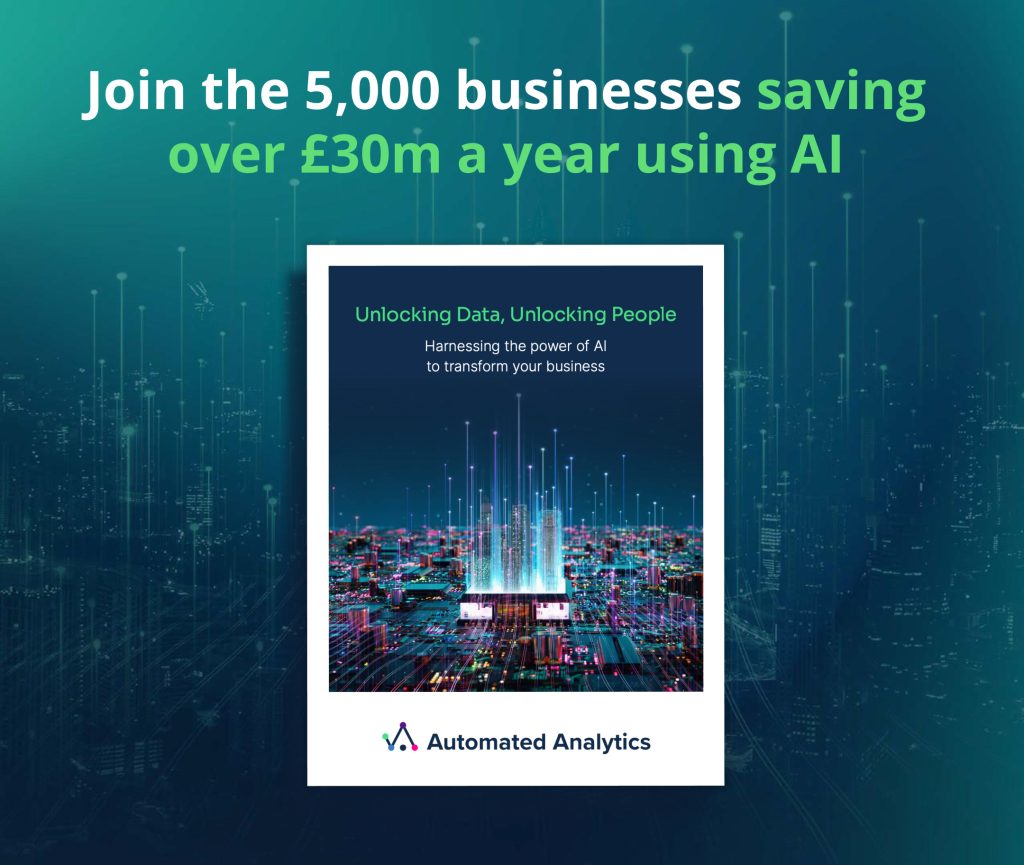Why is the US leading in AI adoption?

Our new White Paper ‘Unlocking Data, Unlocking People’ delved into why the UK is falling behind the US in AI adoption.
While the UK is striving hard, the US is, at this point, still leading the march. In the view of Automated Analytics founder Mark Taylor, this results from the tendency within UK business to be risk-averse; prioritising proof of concept and the need to ensure AI solutions work, before committing to them.
This cautious approach leads to longer decision-making processes and limited resulting adoption of AI technologies. In contrast the American market is characterised by a greater willingness to take risks and embrace innovation. US clients are more inclined to simply jump into AI implementations, viewing them as opportunities to gain a competitive edge without significant downside risk.
This disparity in attitude towards risk and innovation is reflected in the adoption rates of AI technologies. Automated Analytics serves over 3,500 clients in America including Fourth, Pizza Hut and KFC compared to 1,500 clients in the UK including British Gas’ Dyno-Rod, Hamptons Estate Agents, Europcar and City of Doncaster Council, despite having operated in the UK for a far longer period (While the UK has a smaller market size than the US, the difference in adoption rates suggests a deeper cultural and regulatory influence on AI adoption).
From a broader perspective, research also supports the notion that the US is ahead of the UK in AI adoption. The IMD World Digital competitiveness Ranking for 2023 continues to rank the US higher than the UK in AI readiness, investment, and innovation. Factors contributing to this gap include differences in regulatory environments, investment priorities and cultural attitudes towards risk-taking and entrepreneurship. The disparity between US/UK adoption rates should be a cause for concern, though not of despair, for policymakers, businesses, and stakeholders in the UK. As AI continues to drive technological advancements and reshape industries, falling behind in adoption could result in missed opportunities for economic growth, innovation, and competitiveness on the global stage. For this reason, addressing the cultural, regulatory, and investment barriers to AI adoption is essential in enabling the UK to catch up and restore competitiveness.
UK management and its relationship with AI.
A survey of more than 1,000 B2B business leaders, conducted on behalf of Automated Analytics by YouGov in March of 2024, provides valuable insights into their perceptions and expectations regarding AI and its potential impact on business operations.
Some 56% of respondents felt they had a reasonable understanding of the potential for AI in their business, while a somewhat concerning 44% felt they did not. Yet while 52% believed that AI has the potential to improve productivity, a sizeable 39% did not. Equally, 48% recognised the benefit AI might bring to forecasting, while an again sizeable 39% failed to see this. Perhaps most encouragingly, 59% of respondents agreed that AI will make collection and analysis of data more accurate, though with some 30% doubting its ability to impact even this area. While this represents two ‘believers’ for every ‘doubter’, it should be of concern that almost 1 in 3 business leaders surveyed were blind to the potential for AI in analysing their data, and so in unlocking the performance and productivity wins which its insights could enable.
The two AI obstacles holding back UK business.
The White Paper reveals ‘trust’ and ‘risk aversion’ are significant barriers holding back UK business from adopting AI at the pace seen in other markets. The cultural difference between the UK and the US, with the prevailing sentiment of cautiousness in UK business discussed earlier, and businesses seeking tangible proof of AI’s effectiveness before fully committing to its adoption. This contrasts with the more innovation-driven mindset prevalent in the US, with businesses willing to take calculated risks and embrace new technologies without the need for extensive validation. The conclusion from this would be that UK businesses risk missing out on the transformative potential of AI due to this lack of trust and reluctance to venture into uncharted territory, no matter how promising its potential.
AI and the fear of job losses
Business leaders may also be responding, consciously or subconsciously, to fears amongst their workforce that adoption of AI will result in job losses. However, an anecdotal yet significant volume insight from across Automated Analytics’ client base, debunks this myth. Of the company’s 5,000 clients globally, not a single one reports job losses as a result of implementing AI solutions. On the contrary, AI insights have generally led to significant cost savings, creating opportunities for businesses to hire more efficiently and enhance overall performance.
This underscores AI’s transformative potential to drive productivity gains by augmenting human capabilities, rather than replacing roles. After all, the advent of the calculator didn’t make anyone redundant, and the Kindle hasn’t obliterated publishing.
Mark Taylor, CEO of Automated Analytics said: “Using the power of AI to help customers identify and secure talent quicker and more effectively is how employers can win the battle for hourly employees and reduce staff shortages.”
Download the White Paper in full here.